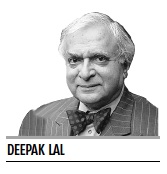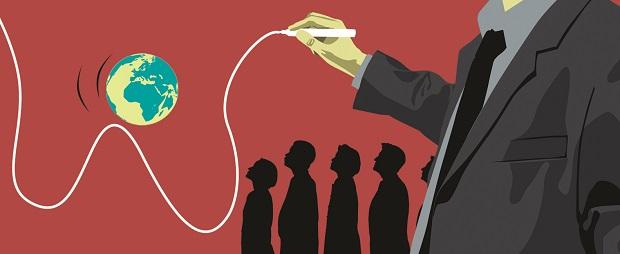 The world doesn’t have a true Liberal International Economic Order anymore, and Trump’s actions should be judged accordingly
The world doesn’t have a true Liberal International Economic Order anymore, and Trump’s actions should be judged accordingly
by Deepak Lal
To read the outpourings of the “great and the good” President Donald Trump is killing the liberal world order. The latest example is an article by the deputy director of the International Institute of Strategic Studies, Kori Schake, titled “The Trump Doctrine is winning and the World is losing”, (The New York Times, 17 June 2018). But is this true?
In an article in 2005, I had noted that the institutions set up after the Second World War to create a new Liberal International Economic Order (LIEO), after the disintegration of the first British LIEO in the inter-war years, had served their initial purpose and ironically become purveyors of a “new dirigisme”. (“The threat to Economic Liberty from International Organizations”, Cato Journal, Fall 2005). This was because instead of following the classical liberalism of the 19th-century LIEO, these institutions had come to promote the dirigisme embodied in what has been termed “embedded liberalism”: An appropriation (as Schumpeter noted) by social democrats of the term “liberal”. The Trump Doctrine — if it can be given such a highfalutin term for the US President’s chaotic tweets and musings — is clearly from his actions in domestic economic policy in line with the classical liberal tradition that has remained an important part of conservatism in the US (see my Reviving the Invisible Hand, Princeton University Press). His tax reforms, deregulation particularly of the dirigiste controls on coal and shale oil and gas of his predecessor have — as classical liberals expected — not only boosted economic growth but also turned the US into an oil superpower. These actions have promoted rather than killed a dying domestic classical liberal order.
But for Mr Schake, as an international relations expert, it is probably the foreign policy (including trade) aspects of what is called the Trump Doctrine that cause the most angst. As I argue in my recent book (War or Peace: The Struggle for World Power, Oxford University Press), after the fall of the “Evil Empire”, the unipolar moment was foolishly seen as the “end of history”, which soon bit back with the Great Recession of 2008. This gave rise to a league of dictators — in China, Russia and Iran — who, sensing US decline, chose to challenge US hegemony through proxy wars and illegal territorial annexations (Crimea, and the South China Sea). Thus, the rule-based international order had been challenged well before Mr Trump ascended to the presidency. With President Obama’s eschewal of the use of US’ unmatched military power, global disorder followed with — as the Pope observed — a piecemeal Third World War that seems to have begun. It is in this geo-political inheritance of the Trump administration, that its foreign policy and trade actions, which have so enraged the clerisy, should be seen.
First, the US withdrawal from the Paris agreement on climate change. As this column has argued for many years, the case for curbing CO2 emissions through reducing the use of fossil fuels to stop global warming is deeply flawed. Hence, I cannot but commend President Trump from repudiating the Paris accord and insisting on getting independent scientific advice on the claims made by previously biased scientific advisors. (see my Poverty and Progress, Cato Institute).
Second, his decision to withdraw from the Iran nuclear deal and reimposing economic sanctions has infuriated the Europeans as the sanctions include drastic penalties for European countries doing business in Iran. President Trump gave good arguments to French President Macron and German Chancellor Merkel for mending, rather than ending, the deal by including more thorough nuclear on-site inspections and an end to the sunset clauses. With Israel finding secret information that Iran had violated the nuclear deal and the non-proliferation treaty, and never offered a full account of the past military dimensions of its nuclear program, this flawed deal, signed by President Obama but never approved by Congress, needed to be ended if it could not be amended. Two former distinguished Secretaries of State — Henry Kissinger and George Shultz — opposed the Obama deal.
Third, is moving the US embassy in Israel to Jerusalem as part of a new Mideast strategy whilst fulfilling a past US Congressional commitment. As Daniel J Arbess (“Is Trump following a Grand Mideast strategy?” WSJ, June 6, 2018) argues, after Mr Obama’s abandonment of the US role in the Mideast, Mr Trump has forged a working consensus between Israel, and its Arab neighbours — Saudi Arabia, Egypt, the UAE and Jordan — to meet three challenges: “Containing Iran’s imperial ambitions and support for terrorist groups like Hezbollah; stabilizing Syria to finish off ISIS, while also ending Assad’s destruction of Syrian Sunnis; and resolving the Israeli-Palestinian conflict”. Though the last is now a low priority for the Arabs, its resolution remains important for Israeli security. It is in this context that Mr Trump’s “recognition of Jerusalem as Israel’s capital codified a truth that must be accepted before Israel and the Palestinians can move together”. For, as this column has argued in the past, there is no way in which — for geo-strategic reasons — Israel can give up east Jerusalem.
With the Russians as a major player in Syria, any solution to the Syrian imbroglio requires their acquiescence. So, Mr Trump is right to want to talk to Vladimir Putin whilst maintaining the onerous economic sanctions for his annexation of Crimea, meddling in the US elections and the Sergei Skripal poisonings in Salisbury. But Mr Putin, as Mr Arbess notes, “has little affinity for the Iranian ayatollahs, especially with their competing nuclear and energy ambitions.” He is in bed with Mr Assad and Iran for the lack of better alternatives. He would prefer an Israeli-American partnership to stabilise the Middle East as it would also help the US “in restraining Mr Putin’s misbehavior at home and abroad”. Hence, despite the disquiet of the Europeans, Mr Trump’s initiative to engage with Russia is advisable.
This leaves foreign trade. As a lifelong free-trader, my natural inclination is to question Mr Trump’s trade policies. But, the world trading system has been broken for some time since GATT’s early success in lowering tariffs globally in its various rounds. By the early 1980s, the US had adopted a “two-track” approach: Multilateralism through GATT and preferential trading arrangements (PTAs) to liberalise trade with like-minded countries, as the European Union refused to accept free trade, particularly in agriculture. The unintended consequence has been the proliferation of preferential trade agreements (PTAs) in the 1990s with the fragmentation of the multilateral trading system. Mr Trump’s attack on North Atlantic Free Trade Agreement (NAFTA) and the EU (in the recent G7 meeting) is better seen in geopolitical rather than economic terms, as a means to get them to move to a trading system with no subsidies or tariffs (as he proclaimed at the G7 meeting). Whilst his ongoing trade attack on China is a badly needed response to China’s flouting of the World Trade Organization (WTO) rules and the theft of intellectual property. We have to wait and see if these assaults on the currently far-from-liberal trading system will succeed. But, like the other charges laid at Mr Trump’s actions of undermining a classical liberal world order, this too is misplaced. The world order is far from being a true LIEO, and Mr Trump’s frontal attacks on it might make it more so.
Read the original article at The Business Standard here…
Deepak Lal is the James S. Coleman Professor Emeritus of International Development Studies at the University of California at Los Angeles, professor emeritus of political economy at University College London, and a senior fellow at the Cato Institute. He was a member of the Indian Foreign Service (1963-66) and has served as a consultant to the Indian Planning Commission, the World Bank, the Organization for Economic Cooperation and Development, various UN agencies, South Korea, and Sri Lanka. From 1984 to 1987 he was research administrator at the World Bank. Lal is the author of a number of books, including The Poverty of Development Economics; The Hindu Equilibrium; Against Dirigisme; The Political Economy of Poverty, Equity and Growth; Unintended Consequences: The Impact of Factor Endowments, Culture, and Politics on Long-Run Economic Performance; and Reviving the Invisible Hand: The Case for Classical Liberalism in the 21st Century.


